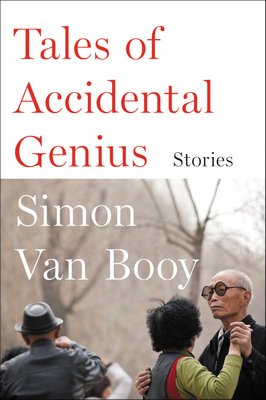
“Write what you know” is familiar advice often passed from teacher to student. If Simon Van Booy once received these words of wisdom, and practices them, he clearly knows a great deal more than the rest of us. He understands the world of fashion, the diseases of goldfish and he knows a thing or two about Chinese tricycles, as well as Chinese karaoke.
Mr. Van Booy’s new collection of short stories, “Tales of Accidental Genius” (Harper Perennial, paper, $14.99, 256 pp), is his first since “Love Begins in Winter,” the book that won the Frank O’Connor International Short Story Award in 2009, the most prestigious for the genre. It follows his stunning novel, “The Illusion of Separateness.” Mr. Van Booy, whose fiction can be found in 17 languages, has quite the reputation—not only on the East End, where he previously lived part-time, but around the world.
The first story in “Tales of Accidental Genius” is about a retired Cockney bodyguard, known as “the menace of mile end,” a man who normally lives a solitary and lonely life. He comes to the rescue of a young homeless man being beaten by several street toughs. Even at his advanced age, he is still a mountain of muscle and more than a match for them. The experience of helping another person unclenched his previously closed life.
In “The Goldfish,” an elderly man is beside himself because his fish is floating upside down in its tank. He cannot accept the obvious death of his pet. A mercenary pet shop owner suggests it may be suffering from “swim bladder disorder,” or possibly constipation. The solution is to feed it two peeled organic peas a day. Without giving it away, it is the shop’s assistant, an immigrant from Nigeria, who performs an act of kindness, a slight of hand that leaves the old man baffled, but happy.
In “A Slow and Deliberate Disappearance,” Mr. Van Booy tells us of a magician who performs at a home for the elderly, only to discover the not-so-obvious truth about a man and woman who have found love in the country of dementia. In “Infidelity,” a husband and wife, wonderfully portrayed, are at a point in their lives when all seems well, despite the fact she had been unfaithful. The husband had left her after that and, as he recalls it, we learn of a moment of mystifying insight that sent him back into her arms.
“The Muse” is a story that was commissioned by The Waldorf Astoria. It originally appeared on the Waldorf’s website and was ultimately published in The Waldorf Astoria Magazine. The Waldorf itself is a character in the story, a place where creative people—a beautiful fashion designer and a screenwriter—go to refresh the spirit. Along with the hotel itself, each is really a muse to the other.
The penultimate story, “Private Life of a Famous Chinese Film Director,” involves a Chinese director/scriptwriter on Mallorca supposedly working on a script for “Tai Chi Flaming Fist.” He calls his wife to tell her that he is no longer interested in writing such thin stuff, which people cannot take seriously. “Longwei told his wife that the next picture he made would be a sort of comedy, based on the people he had known growing up in the Hutong community in Beijing,” Mr. Van Booy writes. “The action would not come from the fist or foot—but from memory, and from the struggle within.”
This has set us up for the final story, “Golden Helper II,” which is the script that Longwei wrote, or more correctly, the “working script/story notes.” It is of almost novella length and laid out on the page like a prose poem. Its subtitle is “An Epic Fable of Wealth, Loneliness, and Cycling.” It is a gently funny work in which a blind vegetable seller has invented a tricycle that uses three chains and moves very fast with very little effort. The tricycle is called “Golden Helper II.” Its fate and its influence on the life of the peddler’s son is the nub of the story, a story that has all the atmosphere of a children’s tale. The word “fable” is well chosen. Coincidences, moral choices and ghosts all shape the outcome.
The blind and the deaf frequently appear in Mr. Van Booy’s work. An early story was about a deaf violinist. A blind museum curator figures prominently in his novel “The Illusion of Separateness.” The book gives credit to the Bethel Center for Blind Children in Beijing, which seems to be doing amazing things for the blind. It is clearly something close to his heart. In fact, two members of the Bethel community translated portions of the text into Chinese.
Occasionally, Mr. Van Booy veers dangerously close to preciosity, as when he has a character say, “You don’t write stories—they write you.” But more often than not, his language is simple and spare, and can unveil universal truths, as when Alexandra, in “Muse,” notes, “We’re not who we think we are, nor how others see us … Long before death, we die a thousand times at the hands of definition.” Also, when she writes in the screenwriter’s manuscript, “The story of love is also the story of loneliness.” Phrases such as these have what James Agee called “the bewildering force of a chenille sledgehammer.”
Mr. Van Booy continues to be a writer to reckon with and the stories in “Tales of Accidental Genius,” especially “Golden Helper II,” cling to the memory long after our eyes leave the page.
Simon Van Booy will read from “Tales of Accidental Genius” on Saturday, December 19, at 5 p.m. at Canio’s Books in Sag Harbor. For more information, call (631) 725-4926, or visit caniosbooks.com.